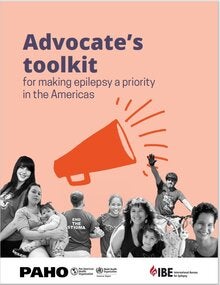The Advocate’s Toolkit for Making Epilepsy a Priority in the Americas was developed to help individuals and organizations to identify opportunities that provides full participation of people with epilepsy in the community. It was developed for organizations looking for guidance, ideas, or inspiration as they develop advocacy projects around epilepsy. The toolkit is aimed at civil society organizations working across the Region of the Americas and has been heavily influenced by the needs and experiences of people with epilepsy. The various modules and topics addressed in this toolkit can be used both as a step-by-step guide to lead in the advocacy planning process, or as a reference or set of stand-alone resources that can be used when encountering a problem or opportunity in the context of existing epilepsy policy, legislation, or access to care. It is not meant as a stand-alone guide on how to conduct advocacy activities. Instead, it provides key prompts for reflection and discussion, basic advocacy pointers (the theory), and essential tools to help civil society to work logically through the various stages of an advocacy planning cycle. It is meant to be versatile and useful to a variety of audiences. It recognises that stigma is a major barrier preventing social inclusion and access to health care and treatment for people with epilepsy. Civil society can use the guidance, evidence, and templates to promote epilepsy as a public health priority in their local community or at the national, and regional levels. The toolkit was co-developed by the Pan American Health Organization and the International Bureau for Epilepsy (IBE) with important input from key stakeholders, including persons with epilepsy and their families, and with healthcare providers from the Region. It includes input from others with a connection to epilepsy either personally or through an organization. Through an initial needs assessment, stakeholders provided their perspectives on resources that were currently available to them, best practices they wanted to share, areas where they were seeking support, and opportunities for additional support or collaboration. This toolkit was developed based on that input as well as on feedback on initial drafts. The toolkit can be used as a companion document to support implementation of the WHO Intersectoral Global Action Plan on Epilepsy and Other Neurological Disorders (IGAP) which recognises that epilepsy is treatable, medication can be made affordable and basic epilepsy care can be provided at the primary care level for all people. All countries across the Americas have ratified IGAP and the UN SDG’s and can use this toolkit to plan their advocacy. The toolkit is full of resources, ideas, and guidance for addressing and dismantling stigma and for monitoring and evaluating progress towards implementation of the IGAP. |

